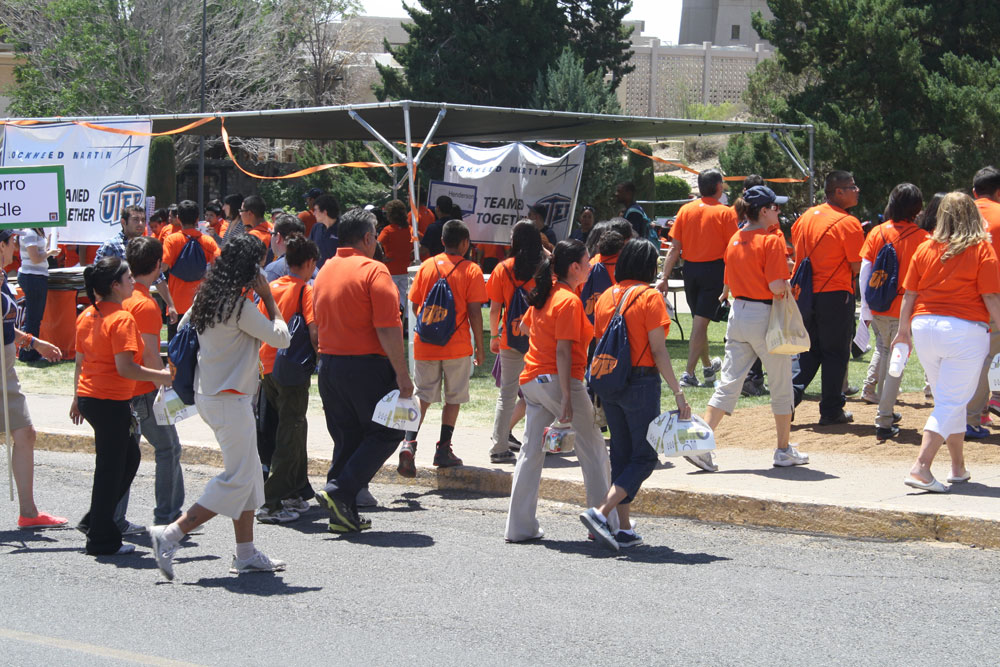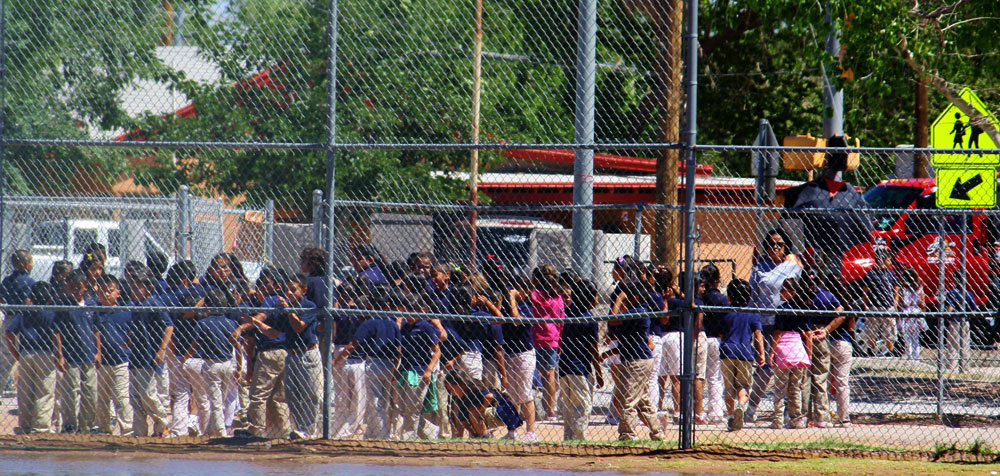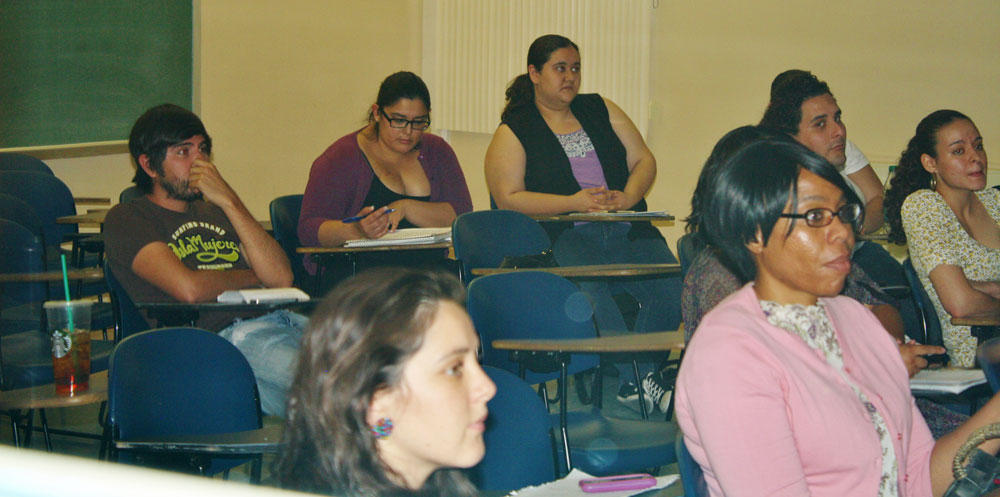EL PASO – Interrogation. Education. Why does a good one cost so much when we pay teachers so poorly? If education is only about training for a job, why not revert to the apprentice system? What are we teaching our children and is that what they are learning?
In El Paso county, with our nine school districts (let’s count them: El Paso, Socorro, Isleta, Clint, San Elizario, Canutillo, Anthony, Tornillo, Fabens), it seems there is always a well-paid superintendent leaving or being fired, a scandal brewing, a different name for the mandated standardized test, or a change in the way drop-out rates are calculated. What doesn’t seem to change is the poor outcome experienced by a majority of students, even the ones who manage to graduate from high school. There are a lot of cooks in this education kitchen, but the food is barely edible. Sometimes it seems criminal, what we’re serving.
I listened to UTEP faculty complain about poor outcomes for 21 years, and I heard a Dean talk about the closed loop: UTEP graduates the teachers that teach the students that UTEP faculty complain about. And where are we now? The optimists among us would say that lots of things have improved and several problems have been fixed. The pessimists (and I now count myself as one) say that despite whatever change has been implemented, the problem has not been solved, and maybe the root of the problem has not even been identified.

Find the leader. (Cheryl Howard/Borderzine.com)
As a social scientist, educational research is a nightmare of hundreds if not thousands of variables, some of them so interconnected they cannot be examined separately. Other variables might have tiny effects by themselves, but culminate in success or failure when combined in certain, sometimes surprising and unpredictable, ways with other variables. It could be that everything about a child‘s education is wrong except for one thing, maybe a teacher, maybe a parent, maybe the school librarian or some other kid that child sat next to that nobody thought to include in the research plan.

Follow the leader. (Cheryl Howard/Borderzine.com)
What do you need to know to be an educated person, or is that one of those questions that gets answered by “you know it when you see it” which is not really an answer at all? What counts as success? Grades? Graduation? Test scores? Happiness? A job? Wealth? What makes one person a good teacher and another one a poor teacher? Is it the students we put in a classroom, some innate quality within the teacher, training or experience, or something else? Are teachers in classrooms with already gifted and motivated students better than ones tasked with turning “at risk” students around?
I certainly don’t have answers to these questions, but I do have some thoughts. They should be chewed well before swallowing, but here they are on a homemade platter. A person who once applied to teach at UTEP did her research on kindergartens at two different schools, one wealthier and one poorer. The kids in the wealthier school were rewarded for academic achievements and for qualities like leadership and creativity. The kids in the poorer school were rewarded for being neat and clean and following directions. This differential evaluation of very young children was supported by both teachers and parents.

The children, from Alarcón Elementary in San Elizario, are in a semi-line and wearing school uniforms. (Cheryl Howard/Borderzine.com)
Children stand in line for an astonishing amount of time in elementary school. If you don’t believe me, volunteer for a day and take a stop watch. Children are not hard-wired to stand quietly in line or sit at a desk for six or seven hours a day. I personally believe that’s why we diagnose so many of them with ADHD and drug them.
It is nearly impossible to teach anything important in a typical class period when you have to spend large portions of it taking attendance, passing papers to the front or back to students, fussing with audiovisual equipment, listening to announcements on a loud speaker, and waiting for the bell to ring. School uniforms neither disguise socioeconomic inequalities nor create an environment more conducive to learning. They may make it easier to punish rebels or train students to work at places like Walmart, and they give students one more reason not to think, except about colors and collars.
However, students are discerning when it comes to respect. They hardly ever offer it to someone who does not reciprocate. Many teachers think respect is a one-way street.
Emphasis on rote learning and memorization may have a place, but we seem to test for knowledge that will not need to be retrieved often in life and ignore important life skills. It makes sense to memorize what six times seven is without a calculator. But there are some things that even a calculator can’t help if the concept is foreign. Recently, a friend told me about a sales clerk who couldn’t figure out the sales tax on his own or even with her help and a calculator (the cash register wasn’t working). It is harder to test for concepts than it is to test for facts, but the facts are easy to find if you know what to look for. My father used to tell me that the real value of an education was to teach you what it was you didn’t know, that truly educated persons knew the limits of their knowledge. My experience tells me that kids who love to read eventually (emphasis on eventually) learn to write, and generally do well, at least in liberal arts majors, if they don’t get waylaid by tragic life events. One student confessed that he had made it all the way through high school without finishing a single book.

Thoughts. What thoughts? Who me? (Cheryl Howard/Borderzine.com)
It is absurd to teach children to be docile and obedient for thirteen years and then expect them to miraculously become critical thinkers and independent readers in the first weeks of college… unless we really intend for them to remain docile and obedient for the rest of their lives. I remember vividly the look of horror on students’ faces when I asked them what they thought. “Oh Miss, please, please don’t look at me, don’t call on me, I don’t have any thoughts.”
Where do we go from here? I suggest returning to the aforementioned kindergarten class. But we have thirteen years to get it right. We should try, at least, in every one of them.



Dr. Howard, you are so well educated, because of the way you write, clarify, explain, but specially because of the way you ask, analyze, because of the things you worry about and the things you feel about and achieve to express so beautifully. You unite social dilemmas and personal dilemmas so nicely, and then leave me worrying about it (which is good). So tell me, how did you were educated?
Hi Dr. Howard, thanks so much for your article. I’m friends with a 10 year old boy, Adan, who will be growing up in a school district in Las Cruces. When I see him, we talk about books he’s read and reading: The BFG, Harry Potter, etc. This is what *he* wants to talk about, which impresses me. Yet I hear he is already struggling academically, and I was wondering what challenges he might face in this particular education system. Your blog is eye-opening. In particular, do you have any thoughts on how to make learning more active in poorer schools?
Thank you,
Miranda
Saradiana, Like most of us, I went to public schools where I had both bad teachers and good. We moved a lot so I went to 1st and 2nd grade in Roswell NM, 3rd and 4th in Pueblo CO, 5th in Palmer MA, 6th and 7th in Falls Church VA, 8th-10th in Cloudcroft NM and 11th and 12th back in Falls Church. I went to college at UNM, for both graduate and undergraduate degrees. It’s a mystery. But two things I think that are so important are curiosity (which all five year olds have) and a love of learning that lasts a lifetime (which only a few adults have). Miranda, Keep talking with Adan and find out what his favorite and least favorite subjects are. Ask him to bring you some of his homework with both good and bad grades. From that you will be able to see what he is being asked to do and how he has responded. Go to garage sales or thrift stores and buy him tons of books you think he will like. Read some of them first so you can discuss them together. At some point you might ask if you could meet his teacher sometime. If you know his parents, maybe you could go with for parent-teacher conference and see how they interact with the school. I do believe that one person can make a difference, so don’t give up. School will be out soon, so summertime might provide time for more interaction, or maybe sponsor him for some enrichment program that is being offered in Las Cruces.
I think this is a great work! We had a class about microcontrollers at my University, but there weren’t many of my classmates who really liked working with them. So almost no one ended up doing anything with microcontrollers after that class. In order to revert that, some friends and I decided to form a Robotics Club at the Uni, where we can learn about microcontrollers and robotics and so we can encourage students that are starting the career to learn and make awesome stuff. =D